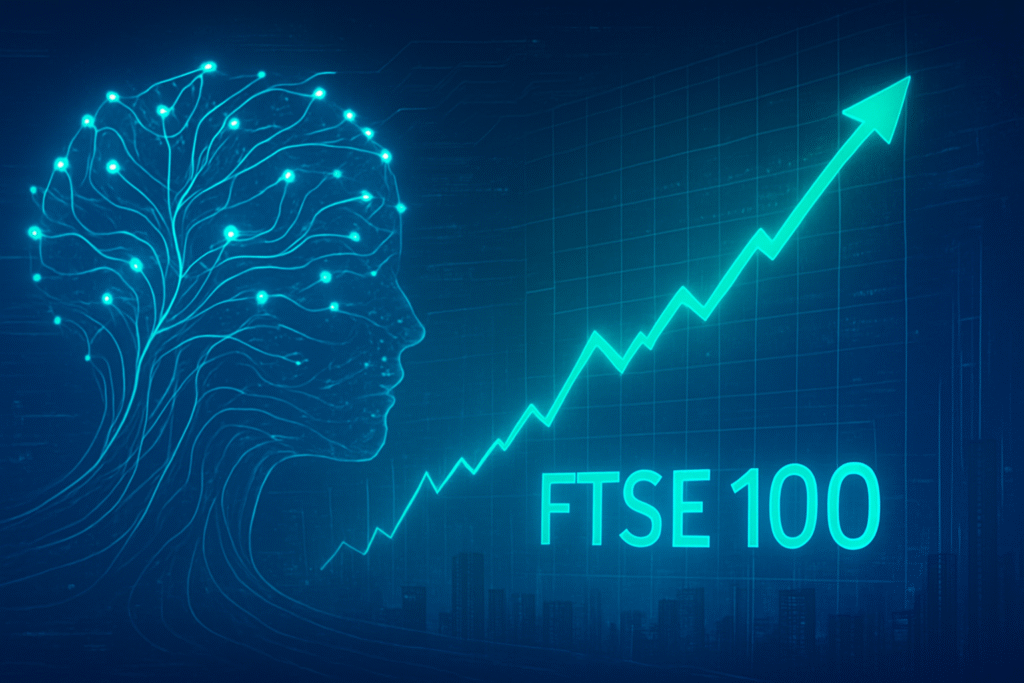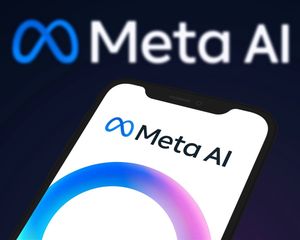
London, UK – October 29, 2025 – Artificial intelligence (AI) has firmly established itself as the undisputed engine of the current global stock market rally, pushing major indices to unprecedented highs. This "AI Gold Rush" is fundamentally reshaping investment landscapes, driving an unprecedented surge in capital expenditure, and demonstrating tangible revenue growth for companies deeply integrating AI into their operations. The global AI market, valued at approximately $391 billion in 2025, is projected to quintuple over the next five years, surpassing previous tech booms in its scale and transformative power.
Amidst this tech-driven surge, London's benchmark FTSE 100 (LSE: UKX) has not only participated but has shown remarkable resilience and a unique set of drivers, repeatedly smashing previous records throughout October 2025. With an intra-day record of 9,770.04 reached today, the FTSE 100 has climbed over 4% in the past month and nearly 20% year-to-date, even outpacing the S&P 500 (NYSE: SPY) and Nasdaq Composite (NASDAQ: QQQ) in sterling terms for the year. This performance underscores AI's pervasive influence, extending beyond pure-play tech giants to a diversified array of industries.
The Technical Underpinnings of AI's Market Dominance
The profound impact of AI on market performance in late 2025 is rooted in several advanced technical capabilities that significantly diverge from previous approaches, eliciting a mix of excitement and apprehension from the AI research community and industry experts.
One of the core drivers is Deep Reinforcement Learning (DRL) for dynamic strategy optimization. Unlike earlier algorithmic trading systems that relied on static, rule-based programming or simpler machine learning models, DRL algorithms learn and adapt dynamically to fluctuating market conditions in real-time. Systems like FinRL-Meta can train DRL agents across hundreds of financial markets, adjusting position sizes during high-volatility events and continuously optimizing strategies. This allows for real-time recalibration of portfolios, a capability largely absent in traditional econometric models which struggle with non-stationary market dynamics.
Generative AI (Gen AI), exemplified by sophisticated Large Language Models (LLMs), has transformed financial forecasting and data synthesis. Gen AI excels at analyzing vast amounts of financial data to identify market trends and make more accurate predictions. By generating synthetic financial data, it allows for the training of robust models for fraud detection, risk management, and market simulations without compromising sensitive real-world data. This moves beyond simply processing existing data to generating new insights and scenarios, offering capabilities like hyper-personalization for investment strategies, a significant leap from traditional forecasting methods that are less flexible and adaptable to rapidly changing market conditions.
A fundamental shift is also seen in Agentic AI Frameworks for autonomous and transparent trading. These frameworks involve multiple specialized AI agents collaborating to perform complex tasks, mimicking a real trading firm with roles such as analyst agents, research agents, and trader agents. Designed for full autonomy, these systems conduct market research, make trading decisions, and continuously evolve strategies. Crucially, many agentic systems communicate their operations and rationale in plain language, offering unprecedented transparency into the AI's decision-making process, a stark contrast to the "black box" nature of many deep learning models.
Finally, Explainable AI (XAI) is addressing the transparency challenge, making complex AI decisions interpretable. Techniques like SHAP and LIME help identify critical factors influencing an AI model’s output, enabling financial institutions to justify decisions in credit scoring, fraud detection, and investment strategies. This is a direct response to regulatory demands and a critical step in building trust, bridging the gap between the predictive power of advanced AI and the need for human understanding and accountability.
Corporate Beneficiaries and Competitive Dynamics
The current AI advancements are creating a clear hierarchy of beneficiaries and intensifying competitive dynamics across the corporate landscape.
Tech giants are at the forefront, leveraging their immense resources and existing infrastructure. Nvidia (NASDAQ: NVDA) continues its dominance, with unprecedented demand for its GPUs and Blackwell AI chips. Microsoft (NASDAQ: MSFT) is investing approximately $80 billion in AI-related data centers in fiscal year 2025, integrating generative AI across its products like Bing search and Azure cloud services. Alphabet (NASDAQ: GOOGL), Amazon (NASDAQ: AMZN), and Meta (NASDAQ: META) are also making substantial investments, with their "Magnificent Seven" counterparts collectively accounting for a significant portion of the S&P 500's market capitalization, largely driven by AI integration.
However, the FTSE 100's strong performance highlights a broader appetite for diversified exposure. Many UK-listed companies benefit indirectly as "picks and shovels" providers for the AI build-out. Mining companies like Rio Tinto (LSE: RIO) are crucial suppliers of copper, aluminum, and iron ore, vital for data center infrastructure and cooling systems, with both metals seeing surging demand. Halma (LSE: HLMA), specializing in safety and environmental technologies, benefits from the increasing number of data centers requiring continuous monitoring. UK-listed IT services firms such as Kainos (LSE: KNOS) and Softcat (LSE: SCL) are well-positioned to benefit from rising demand for AI-enabled transformation. Even traditional financial services firms like London Stock Exchange Group (LSE: LSEG) are embracing AI through partnerships with Microsoft and OpenAI, launching AI-driven products.
The competitive landscape is marked by aggressive investment, a race for talent, and a shift towards custom silicon. Tech giants are increasingly developing their own custom chips (e.g., Google's TPUs, AWS's Trainium and Inferentia) to optimize for specific workloads and reduce reliance on third-party vendors. The "AI skills gap" is a major barrier, creating intense competition for skilled professionals. While tech giants offer broad AI platforms, there's a growing trend towards industry-specific AI solutions, allowing agile AI-native startups to gain ground by specializing in areas like AI cybersecurity or AI-powered biotech. This disruption extends to core functions, with generative AI for code transforming software development and agentic AI moving from pilot projects to practical applications, potentially redefining M&A and customer service.
The Wider Significance: A New Industrial Revolution
The current AI developments in late 2025 represent more than just a technological advancement; they signify a new industrial revolution, profoundly impacting society and the economy, while also raising critical concerns.
AI is now a significant driver of global economic growth, projected to add trillions to the global economy and contribute substantially to productivity growth. Businesses are reporting AI-driven efficiency gains, with AI tools saving employees significant time daily on tasks like summarizing and generating content. This transformative power is seen across sectors: healthcare benefits from advanced diagnostics and drug discovery, finance from automated investing and compliance, and manufacturing from optimized supply chains. AI is even accelerating scientific research, leading to breakthroughs in natural sciences and addressing global challenges like climate change.
Many experts compare AI's transformative potential to historical "supertools" like the steam engine, the internet, and the smartphone. However, AI is considered even more impactful as it automates cognitive functions, not just physical tasks, making its long-term impact potentially even more profound. The pace of advancement since the public release of generative AI tools like OpenAI (private) ChatGPT in late 2022 has been "breakneck," moving rapidly from experimental technology to critical infrastructure. Modern AI models, such as GPT-4.5 (private) with trillions of parameters, dramatically surpass earlier models in scale and capability, enabling more complex applications and wider deployment.
However, this rapid progress is accompanied by significant concerns. Job displacement remains a primary fear, with estimates suggesting millions of workers could be forced to seek new employment or acquire new skills by 2030, particularly in roles involving repetitive tasks and, increasingly, white-collar jobs. Ethical issues and bias are also paramount, with concerns about biased algorithms, privacy risks, the spread of deepfakes, and the "black box" nature of advanced AI models. This necessitates calls for responsible AI governance, stricter regulations, and enhanced transparency. Other concerns include increased cybersecurity threats, the ethical implications of autonomous weapons, and the massive energy consumption of AI data centers, projected to exceed 5% of global electricity by 2030.
Future Horizons: Autonomy, AGI, and Ongoing Challenges
Looking beyond late 2025, the future of AI promises even more profound transformations, driven by advancements towards greater autonomy and the potential realization of Artificial General Intelligence (AGI).
In the near-term, agentic AI is expected to move beyond current generative models to systems that not only respond to prompts but also take initiative, anticipate needs, and act independently to solve problems. These autonomous agents will plan and execute multi-step workflows, becoming indispensable collaborators. Further advancements are anticipated in large and more efficient multimodal models, with expectations for OpenAI to unveil GPT-5 or a significant GPT-4 update, and Google (NASDAQ: GOOGL) DeepMind to release Gemini Ultra or a stable version of Gemini 3.0, enhancing multimodal understanding and reasoning across text, images, audio, and video. The democratization of AI tools will continue, making advanced AI more accessible to small businesses and non-technical users, while Edge AI will enable faster, safer, and more reliable operations on devices.
In the long-term, experts predict the widespread deployment of humanoid robots, automating physical work in parallel with AI automating cognitive tasks. There's a strong belief that AI-accelerated AI research and development will lead to exponential improvements, with some predicting that AGI could arrive within five years, enabling AI systems to achieve superhuman capabilities across various tasks and understand complex fields at a fundamental level.
Potential applications on the horizon are vast, spanning healthcare (diagnostics, personalized treatment, drug discovery), education (personalized learning), law (summarizing laws, drafting contracts), finance (automated planning, fraud detection, complex investment strategies), and transportation (autonomous vehicles). AI will also become ubiquitous in everyday life, assisting with household tasks, and serving as a creative collaborator.
However, significant challenges remain. Data scarcity for training large AI models is a looming concern, with predictions of public data running out by 2026, risking "model collapse" from synthetic data reliance. The high costs and computational power required for AI development pose barriers for smaller organizations. Ethical dilemmas, algorithmic bias, data privacy, and the potential for widespread job displacement require robust regulatory and legal frameworks. Experts predict that agentic AI will become the norm, leading to radical efficiency gains for companies that successfully implement AI, potentially creating a growing gap between "AI leaders" and "AI laggards." While the general public is less convinced, AI pioneers predict that AGI could arrive within the next five years, emphasizing the urgent need for responsible AI practices and ethical governance.
Comprehensive Wrap-Up: A Defining Era for AI
The current AI-driven stock market rally, spearheaded by the diversified strength of the FTSE 100, marks a defining era in AI history. We are witnessing a transition from AI as an experimental technology to a fundamental, critical infrastructure that is reshaping global economies and societies. The key takeaways include the unprecedented economic impact of AI, its role in driving market valuations, and the profound technical advancements enabling new capabilities in areas like autonomous decision-making and data synthesis.
This development's significance in AI history is comparable to the dawn of the internet, but with the added dimension of automating cognitive functions, making its long-term impact potentially even more profound. While the benefits in productivity, innovation, and problem-solving are immense, the societal implications—particularly concerning job displacement, ethical governance, and the concentration of power—demand careful and proactive management. The debate around the responsible development of superintelligence underscores the weight of this moment.
In the coming weeks and months, market watchers should continue to monitor corporate earnings reports for tangible AI-driven revenue growth, track investments in AI infrastructure, and observe the progression of regulatory discussions around AI ethics and safety. The convergence of technological breakthroughs, massive capital investment, and evolving societal impacts ensures that AI will remain at the forefront of global discourse, shaping our economic and social future for decades to come.
This content is intended for informational purposes only and represents analysis of current AI developments.
TokenRing AI delivers enterprise-grade solutions for multi-agent AI workflow orchestration, AI-powered development tools, and seamless remote collaboration platforms.
For more information, visit https://www.tokenring.ai/.





